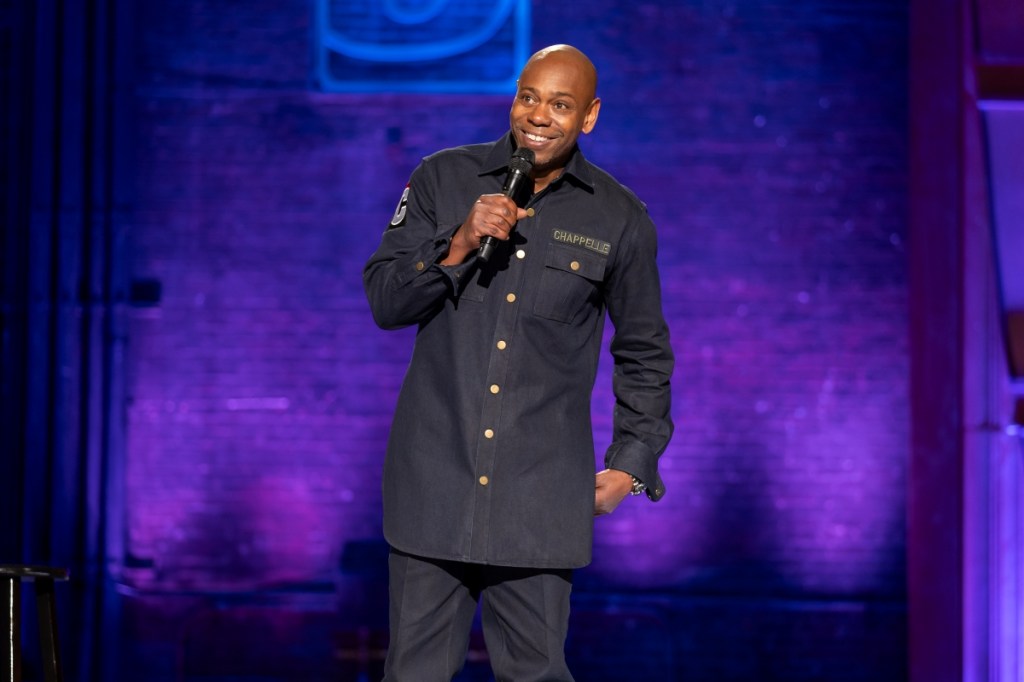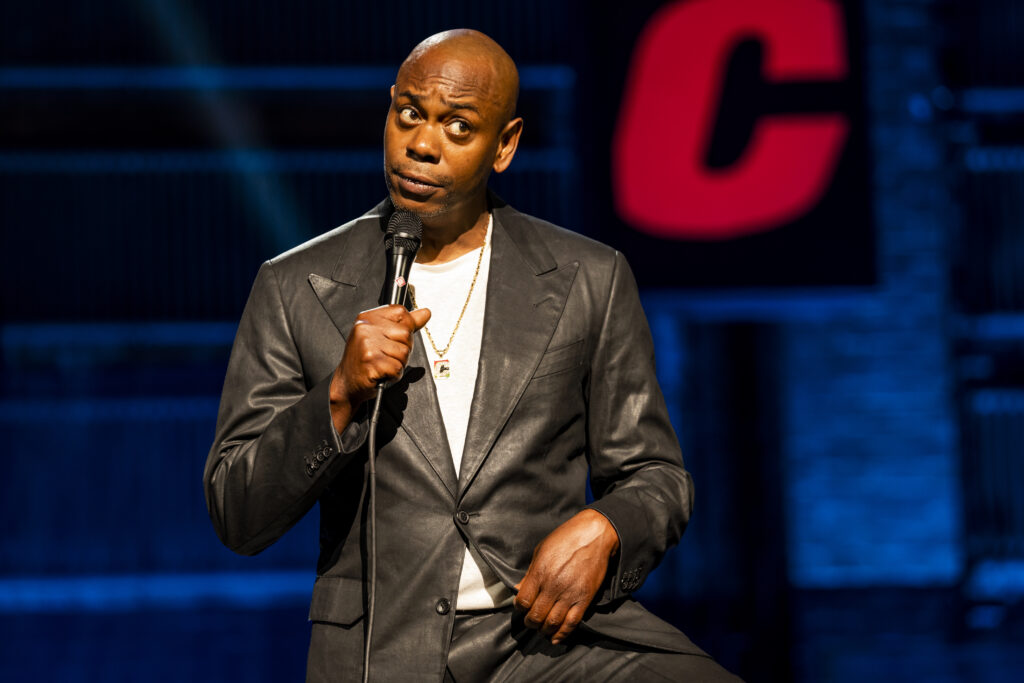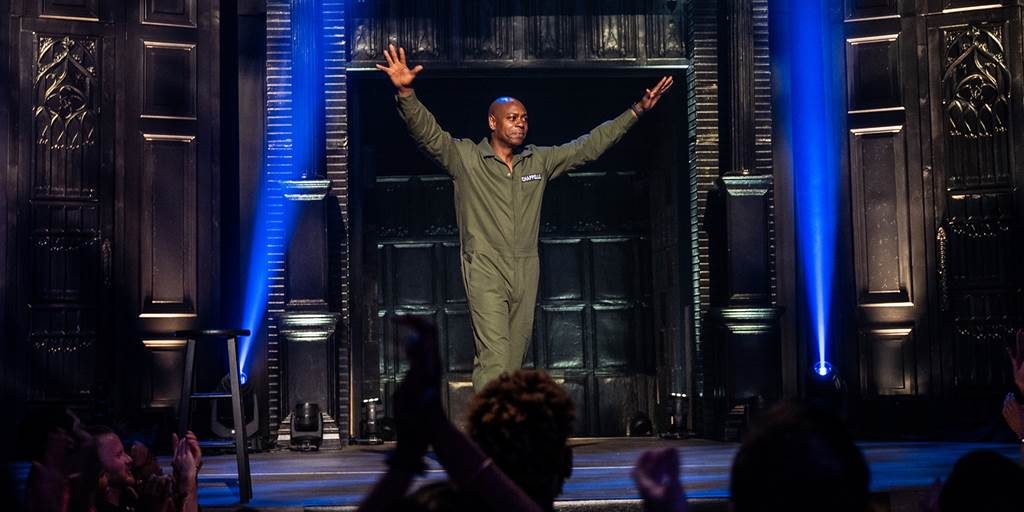The Dreamer is a pathetic mess from a man who simply doesn’t care anymore
Written by Ian Thomas Malone, Posted in Blog, Pop Culture, TV Reviews
The worst kinds of people to watch sports with are the ones who blame the officiating every single time their team gets blown out. The discourse surrounding the past few Dave Chappelle specials has essentially shifted from the comedic value of his work into a broader cultural discussion into the boundaries of the genre itself. Plenty of far-right publications took the non-sequitur route in their praise of Chappelle’s broadsides against the transgender community, lauding the bravery of his so-called “free speech” while casting aside any exploration of the merit of his humor.
The Dreamer is a lazy victory lap from a man with nothing else of value to offer the world beyond self-congratulatory musings on his own legacy, a lethargic effort aimed solely at fueling the far-right grievance industrial complex for another week. The Closer was a mostly humorless treatise centered around the backlash to his prior special Sticks and Stones. While Chappelle claims early on in The Dreamer that the controversy wasn’t worth the trouble, it’s kind of clear that it was, if only for one fairly sad reason. Trans jokes are pretty much all he’s got left.
After an opening bit where he compares trans people to Jim Carrey’s much-lampooned method acting work as Andy Kaufman in Man on the Moon, Chappelle mostly stays away from the trans community, though not without a clunk segue via some cheap jokes aimed at disabled people. There are some tasteless jokes aimed at the broader LGBTQ community, and a joke about identifying as a woman if he was sent to prison that falls in line with his previous special’s fascination with early 2000s style edgelord humor, but you can tell that Chappelle knows that his audience is growing tired of his obsession with gay people. A recurring theme throughout the special is Chappelle’s apparent level of self-awareness toward his reputation as a “lazy comedian.”
The most telling point of The Dreamer occurs halfway through when Chappelle starts on a bit about the Titan submersible. Chappelle admits that this joke never plays well on venues on his tour, but does it anyway, a joke that falls flat yet again at the Lincoln Theater in Washington DC. Longtime Chappelle director Stan Lathan does his subject no favors with constant cutaways to an audience that perpetually looks apathetic as joke after joke fails to land. It would be ridiculous to say that Chappelle doesn’t care what people think. His last two specials were entirely consumed with the reception of his work, at great expense to the comedic value of the material itself.
The DC location was ostensibly selected to draw parallels to Chappelle’s first special Killing Them Softly, also filmed at the Lincoln Theater, that propelled him to international stardom. The two decades that have passed since his debut have been kind to him in many ways, but an uncomfortable reality surfaces time and time again. He’s lost his edge.
Predictably, Chappelle spends a lot of time on the Will Smith slap endured by his friend Chris Rock at the Oscars, and on the spectator who attacked him at the Hollywood Bowl back in May. Chappelle squanders his unique perspective on the situation in favor of lazy jokes that lack the sharp timing that once defined his work. More and more, Chappelle just looks like a bored old rich guy out of touch with the industry he so radically helped define.
Comedy is not as kind to its aging stars as performers in other trades. The Rolling Stones can take the stage for two hours playing material that’s fifty years old. Chappelle can’t spend the night repeating bits from Killing Them Softly, even as his disengaged audience might wish that he would. There’s something fundamentally sad about watching Chappelle reflect on how hungry he used to be, while he tries to fill time in a special that often forgets that it’s supposed to be funny.
At times, Chappelle returns to his favorite punching bag, sprinkling a few trans jokes here and there, even as he pretends to claim that he gives people respect no matter what. He’s certainly resentful of the idea that people think he needs trans jokes to stay relevant, but not enough to do anything about it. There are enough shots at the trans community to ensure that the media will cover his new special, but the pickings are pretty thin otherwise.
The discourse that surrounded his last few specials will undoubtedly continue. People will spend the next few weeks playing armchair referee over the perceived boundaries of comedy. None of that matters.
The simple reality that Dave Chappelle’s newfound champions of the political right so conveniently ignore amidst the hornets’ nests that he loves to kick up is that the man has lost a step. The Dreamer isn’t particularly edgy. Instead, the special is something much sadder for a man who once sat at the top of the world. The Dreamer is boring.













